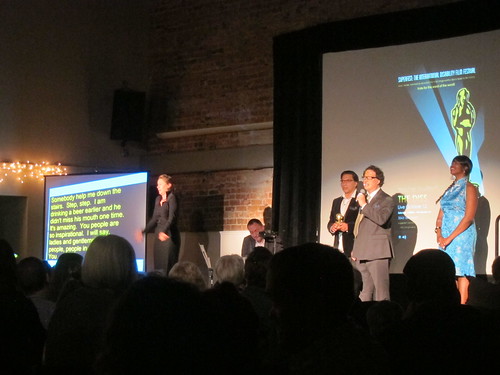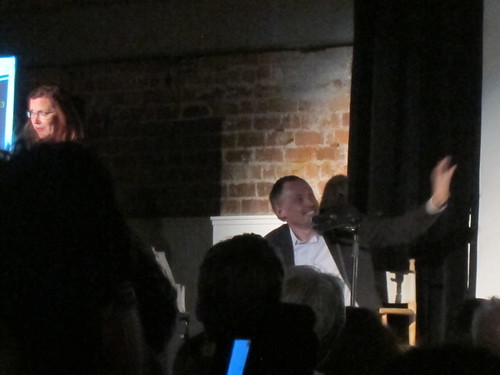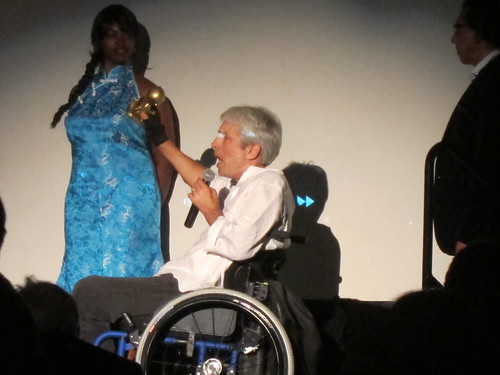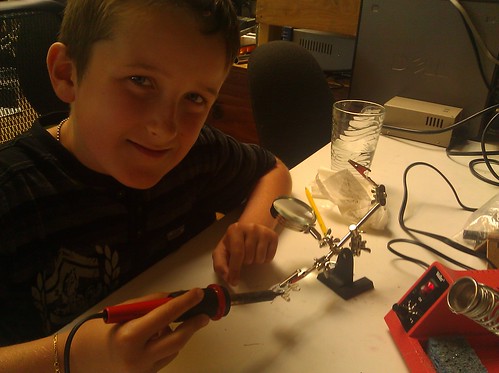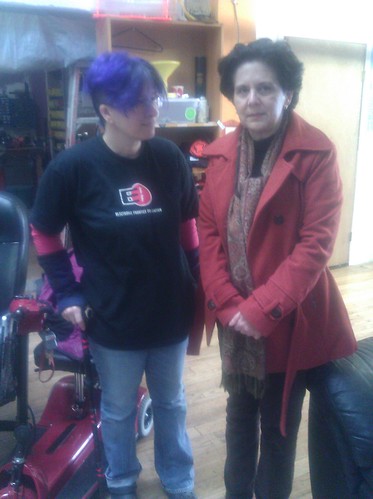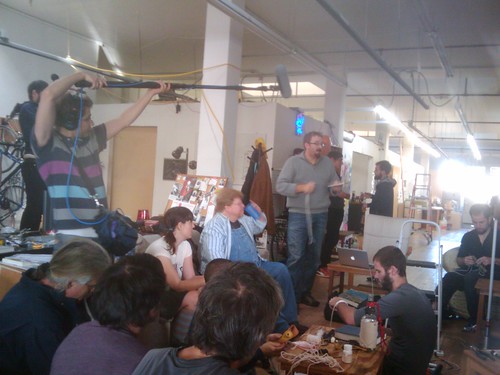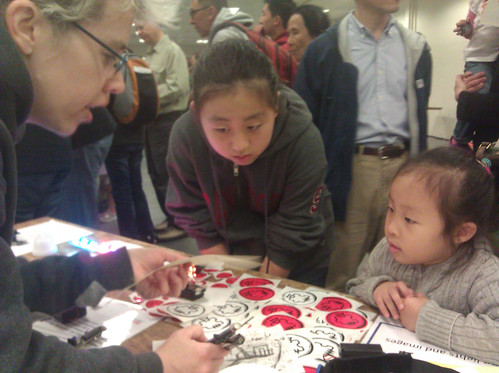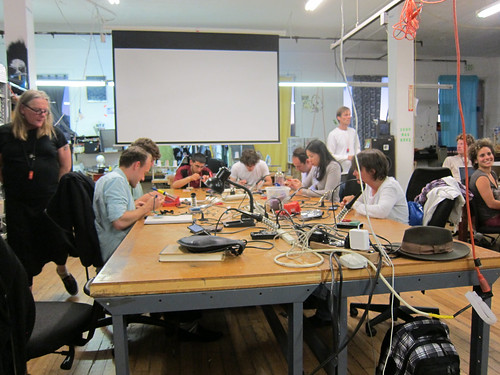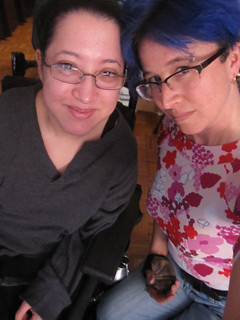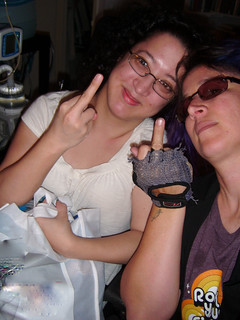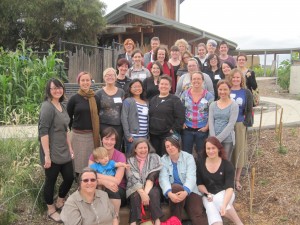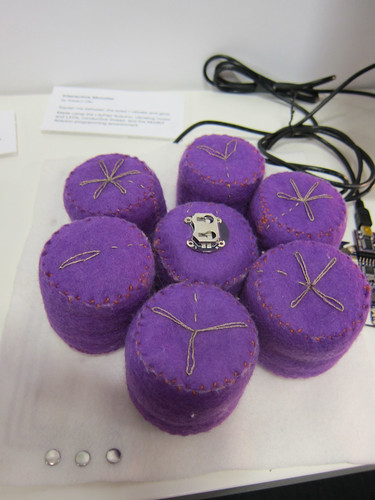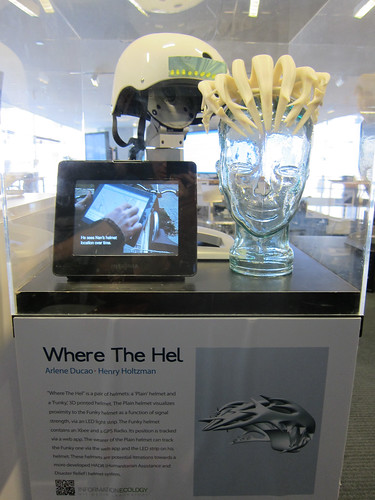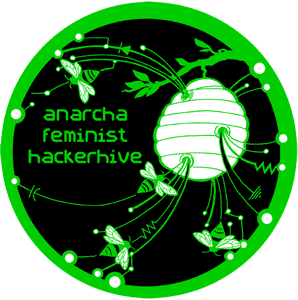Now that I am using a mobility scooter and can’t drive, I ride a MUNI bus about 4 times a day in San Francisco. Most of the time I get on the bus and everything’s fine. A non-trivial amount of hte time, there is some hitch to accessible MUNI travel and either I cope with that gracefully or I get quite angry.
Most of the time in the last few months I get too discombobulated to document the incident. But I’m resolving to do so consistently from now on not for my own desire to vent but as a political act that might benefit many people and might help us act together to improve things.
When I talk about, or twitter or blog about access difficulties on the bus, people tell me “well you should report it”. I found that reporting it is quite complicated. Also, while dealing with mobility issues and a lot of pain and all the demands of my daily life, even on medical leave from work, it’s been daunting to consider this.
I would like to describe some of the aspects of MUNI transit with a wheelchair and to take a good look at the process of making an official complaint. The complaint process is fairly clunky and off-putting. I’m thinking about how to improve that process and make it productive and useful. Meanwhile, I’ll make a policy for myself of not only going through the formal complaint process, but also twittering the bus number and situation. For my own data tracking, I will take a photo of each bus I ride, with the bus number, uploading it to Flickr. I’ll then take notes on access in a paper notebook. For each Flickr photo I will type up my access notes, and tag the photo with #accessMUNI, the bus number, approximate time of day, details of the experience, and #fail or #win. That will give me some data to work with personally.
I wonder how many lifts break on MUNI in a day, in a month? How many complaints about bus access are there? Is that or should it be public information? Could I build a work-around, an end run, basically an alternate complaint system that has intake from paper forms (mailed to me personally), text messages, and a phone app? Or a simpler web form for complaints?
Here is how a smooth bus-boarding goes:
* The driver sees me and immediately tells the apparently able bodied people on the bus and the people waiting for the bus to use the back doors. The driver extends the lift.
* I get on the lift and it brings me up onto the bus
* The driver or other passengers flip up some seats to make room for me and the chair
* I settle in and we’re good to go (meanwhile, everyone else has gotten on or off.)
Keep in mind the wheelchair seating areas, two on most buses, are midway back in the bus, so to get on or off, I have to go past three to 5 inward-facing seats which might be full of people, some of them with shopping carts, strollers, walkers, and suitcases.

In a bad situation, here is what can happen:
* The driver does not know how to operate the lift.
* The driver tries to extend the lift, but it doesn’t work.
* The driver claims the lift is broken.
* The driver says the bus is too crowded and won’t let me on.
* The driver lets all the other people get on the bus through the front door, filling up the seats, then extends the ramp, but now the bus is so full it is very hard to get to the wheelchair seating. People have to get up or move or stand on the seats to let me pass. The people on the bus sometimes get angry and impatient at the fuss and delay.
* The driver does not stop for me at all.
* There are already two wheelchairs on the bus, so the driver won’t let me on.
* Driver has not pulled up to the curb in a place where I can get on or off, and then has to reposition the bus to extend the lift.
* The lift breaks in such a way that the bus can’t move because the doors won’t close.
* I get on the bus but the lift won’t work again to let me off.
* The lockdown clamps either don’t work at all, or lock in a wheelchair’s wheels and won’t release. (I don’t use the locks anymore so I won’t go into this.)
* There is no button for me to push to indicate I want to get off the bus and need the lift, so I have to shout to the driver or get other passengers to let the driver know. (This doesn’t always work: I can miss the stop, or it can mean the driver yells at me.)
* Many other bugs in the system that I haven’t thought to list.
As a more minor complaint I have noticed that all drivers get me to come onto the lift, then lock the front flap upwards so I can’t get off again. Then the driver will sometimes get up to clear passengers from the wheelchair seating area and flip up the seats to make room. In that situation I am sometimes sitting in the rain waiting. I always wonder why the driver doesn’t move the lift to bring me onto the bus, and out of the cold and rain, first? Don’t they think? But, whatever, at least I’m on the bus eventually.
Another detail that would improve courtesy is that when the drivers (correctly) ask people waiting to get on or off to use the back door, and they begin to extend the lift, they almost always overlook obviously elderly and disabled people using canes or simply very frail. It would be much more in keeping with the spirit of things if the driver would encourage these folks to get on the bus through the front door, then deal with the lift and wheelchairs. I often tell the driver, “I’m sitting down — that lady isn’t! Does she need the bus to kneel, first?” But it usually doesn’t work and the driver continues yelling in some elderly person’s face for them to “use the back door”.
I wonder about the training the drivers go through. Most of them can competently operate a lift and are resigned to helping get wheelchair users on and off the bus. A very few are kind and treat disabled people with human decency as a matter of course. I see them deal with difficult people and situations gracefully. It might improve things in general if the drivers had some basic consciousness raising about people with disabilities. Drivers may assume a wheelchair user is paralyzed (they often assume this for me, yet I can walk ) They shout, or condescend, or pat me, or bring in a lot of assumptions to our interaction, and then I see them repeat that pattern with other disabled people who get on the bus. You can’t make people be nice and I don’t need my ass kissed because I’m disabled, but maybe some of that bad attitude feeds into the access problems that I see happen, especially with drivers who regard us as an inconvenience and want to use any excuse to pass us up and who seem to want to make us feel it.
When a lift is broken and a bus passes me up, I always wonder what happens. Does that driver just continue on for the rest of the shift, passing up an unknown number of people who needed a lift? Do they report the broken lift right away? What happens?
Here is a #49 bus, number 8195, that passed me up yesterday at Van Ness and 26th, claiming a broken lift:

So, moving onward to the complaint process and the forms online. Basically this is the bug reporting system. San Francisco uses the 311 system. Here is the 311 page that leads to the complaint form. People with compliments or complaints can use the web forms, or can call 311 or a full phone number to give feedback. There is a link to an accessible form, but it isn’t really an accessible form, it’s instructions to call the 311 number if you can’t use the web form.
Here is screen one of the complaint form. It asks for an email address and a repeated email address confirmation. You have the option to skip this step.

Then I get a screen that either adds my address to the 311 database, or tells me it’s already in there. It tells me to call 911 in a real emergency and gives me a disclaimer about privacy. There are Back and Next buttons.
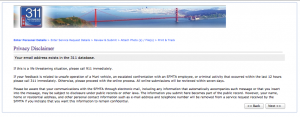
Screen 3 is a beauty. It’s 26 fields, 8 of them required.
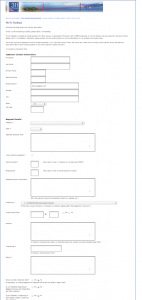
Here are their fields. Required fields are marked with an asterisk. Just for fun, I bold faced the options that I need to complain about most often.
1. First Name
2. Last Name
3. Primary phone
4. Alternate phone
5. *Email address (never remembered from one session to the next; no login possible)
6. Address
7. City
8. State
9. Zip code
*10. Request category — a dropdown menu with these options:
a. Conduct – Discourteous/Insensitive/Inappropriate Conduct
b. Conduct – Inattentiveness/Negligence
c. Conduct – Unsafe Operation
d. Services – Criminal Activity
e. Services – Service Delivery / Facilities
f. Services – Service Planning
g. Services – Miscellaneous
11. *Request type. This dropdown changes depending on which Request Category was selected in field 10.
a1: 301 Discourtesy to Customer
a2: 302 Altercation: Employee/Customer
a3: 303 Fare/Transfer/POP Dispute
a4: 304 Mishandling Funds/Transfers
a5: Refused Vehicle as Terminal Shelter
a6: General Unprofessional Conduct/Appearance
b1: 201 Pass Up/Did Not Wait for Transferee
b2: 202 Ignored Stop Request
b3: 203 No EN Route Announcements
b4: 204 Inadequate/No Delay Announcements
b5: 205 Offroute/Did Not Complete Route
b6: 206 Not Adhering to Schedule
b7: 207 Refused to Kneel Bus/Lower Steps
b8: 208 Did Not Ask Priority Seats to be Vacated
b9: 209 Did Not Pull to Curb
b10: 210 Refused to Accomodate Service Animal
b11: 211 Unauthorized Stop/Delay
b12: 212 Did not Enforce Rules/Contact Authorities
b13: 213 General Distraction from Duty
c1: 101 Running Red Light/Stop Sign
c2: 102 Speeding
c3: 103 Allegedly Under Influence of Drugs/Alcohol
c4: 104 Using Mobile Phone or Radio
c5: 105 Eating/Drinking/Smoking
c6: 106 Collision
c7: 107 Fall Boarding/On Board Alighting – Injury
c8: 108 General Careless Operation
d1: 501 Altercation: Miscellaneous
d2: 502 Larceny/Theft
d3: 503 Fare Evasion/Transfer Abuse
d4: 504 Disorderly Conduct/Disturbance
e1: 601 Delay/No-Show
e2: 602 Bunching
e3: 603 Switchback
e4: 604 Vehicle Appearance
e5: 605 Vehicle Maintenance/Noise
e6: 606 Lift/Bike Rack/Securements Defective
e7: 607 Track/ATCS Maintenance
e8: 608 Station/Stop Appearance/Maintenance
e9: 609 Elevator/Escalator Maintenance
e10: 610 Fare Collection Equipment
e11: 611 Signs, Maps, and Auto-Announcements
f1: 701 Insufficient Frequency
f2: 702 Lines/Routes: Current and Proposed
f3: 703 Stop Changes
f4: 704 Shelter Requests
g1: 801 NextMuni/Technology
g2: 802 Advertising/Marketing
g3: 803 Personal Property Damage
g4: 804 Fare Media Issues
g5: Muni Rules and Regulations
12: Expected Response Time (7 days)
13: checkbox for Disclaimer
14: * Vehicle number
15: Employee ID
16: Employee physical description
17: * Line/Route (Dropdown of all the routes)
18, 19, 20: Date, Time, am/pm
21: Location
22: * Cross Street
23: * Details
24: Do you want a response letter?
25: Was this an ADA violation?
26: If it was an ADA violation, do you want a hearing?
(If “Yes” is selected, and the operator is identified, a telephone or in-person hearing will be scheduled to address the issue)
Sometimes the form returns an error message!

When it works, I get a confirmation screen with an option to go back or to confirm the info.
After confirmation I get an issue tracking number, and if I’ve given my email, an email with all the information I submitted plus the tracking number. So, if a person goes through all these screens successfully, the tracking system seems pretty decent.
My main criticism of the form is that it requires the user to decide on a taxonomy for their complaint. The complaint must fit into one of the dropdown menu options, but the possible options are shown only after the user decides what category it should be in. The complaintant should see all the options and should have a clear “miscellaneous/not included in these options” possibility from the start. THey shouldn’t have to put the complaint into a category at all. The computer can assign a category for it based on the user’s choice from a single dropdown. Uncategorizable complaints, or complaints from people not patient enough to read through the dropdown options, should be accepted too, because they are potentially useful data points. I don’t care if someone just wants to say “Fuck You MUNI” — that is not super constructive, and yet it still gives useful information in that someone was dissatisfied.
The MUNI complaint form appears to be designed with an official bus inspector in mind as the “complaintant”.
I have never seen a bus driver put the restraint system on for a wheelchair user, by the way, though some drivers have tried to get me to lock myself in with the wheel clamps. I’ve actually only seen one guy in a cheap E&J chair with no working brakes use the wheel clamps and never seen *anyone* use the belt system. It is unrealistic and not very workable. I’m sure someone out there uses it and likes it, though.
The “compliment” form is much simpler than the complaint form.
I can picture many other ways to collect this data. Maybe by building a system to take simplified complaints by text message from a feature phone (like Krys Freeman’s Bettastop prototype), or from a phone call. Paper complaints should also be possible, maybe by postcard. Complaints should be collected to figure out where problems may be clustering.
There could be a variety of useful smartphone apps as well. Though how many other disabled people on the bus do I ever seen with an iPhone? Take a wild guess. None! (That number will grow as GenX ages.) Accessibility problems should be reported via smartphone by able bodied people routinely, rather than that issue being left to the people with the least energy and resources.
It is hard to know what details you will need in making a complaint. Bus number, time of day, route number, location of the issue are the main details. I could make preprinted notepad forms and distribute them to other people on the bus, asking them to collect data.
I could see what my experimental data collection on Flickr leads to and if I can get anyone else to do the same and use the same hashtags.
And I could certainly go to one of the MUNI accessibility committee meetings to see what they talk about. Mainly at this point I’d like to know what happens with the data collected and how I can obtain it. Do particular lines have more wheelchair users, or more lift breakdowns? Particular times of day? What could be done about that?
Ideally, lift breakage or other issues would be reported in as close to realtime as possible, and hooked into a great open source system like QuickMuni? What about an app that knows what bus I’m on already, and for which I can just hit a few buttons to give simple feedback?
The thing that pisses me off most of all is trying to ride the bus during a busy time. Drivers then sometimes let 20 other people get on the bus first through the front doors. Good drivers tell everyone to board from the back door, and lower the lift immediately. Bad drivers delay everyone if they let the able bodied people go in the front, then don’t get them to move back, and then the driver refuses to let me on the bus. Leaving me in the dust is just the logical, reasonable thing to do in those driver’s minds. I had one driver on the 24 line yell at me for not *thanking him* for explaining why he wouldn’t let me on the bus. You can imagine my incandescent rage as I am deemed inconvenient and it is as if I have no right to take up space, while every other person, their shopping bags, strollers, and so on are given as much convenience as they could wish. It is for those moments that I’m going to take a photo of every bus I attempt to board, even before there is a problem.
